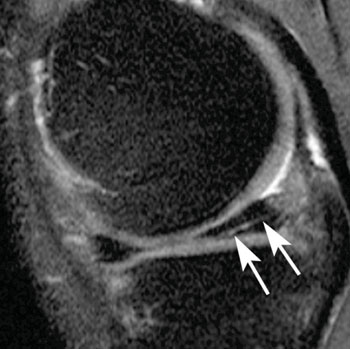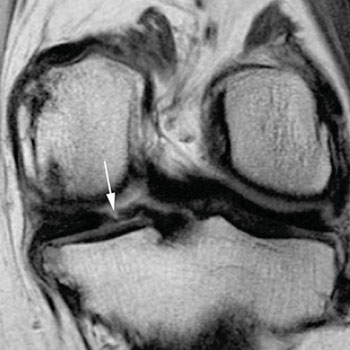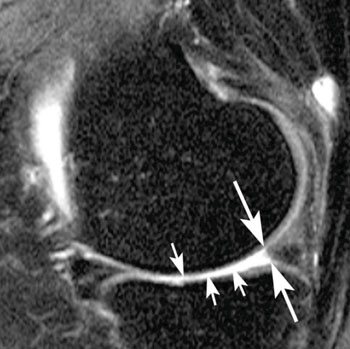Meniscal Knee Surgery May Lead to Arthritis and Cartilage Loss
|
By MedImaging International staff writers Posted on 28 Dec 2014 |

Image: Examples of meniscal tears and status after surgery. Sagittal intermediate-weighted fat-saturated image shows a typical horizontal-oblique meniscal tear of the posterior horn reaching the undersurface of the meniscus (arrows) (Photo courtesy of RSNA).

Image: Examples of meniscal tears and status after surgery. Coronal proton density-weighted image shows another example of a tear, which represents a vertical tear of the posterior horn of the medial meniscus (arrow) (Photo courtesy of RSNA).

Image: Examples of meniscal tears and status after surgery. Sagittal intermediate-weighted fat-saturated image post-surgery shows substance loss of the posterior horn of the medial meniscus (large arrows) and concomitant cartilage (Photo courtesy of RSNA).
A widely used surgical procedure to repair meniscal tears may increase the risk of osteoarthritis and cartilage loss in some patients, according to new research. In the study, 100% of knees that had undergone surgery went on to develop arthritis, compared to 59% of those that had meniscal damage but did not have surgery.
The study’s findings were presented December 3, 2014, at the annual meeting of the Radiological Society of North America (RSNA), held in Chicago (IL, USA). The findings show that the decision for surgery requires cautious consideration to avoid faster disease onset, researchers reported. The new study centered on the meniscus, a wedge-shaped portion of the cartilage in the knee that acts as a shock absorber between the femur and tibia. The two menisci in each knee also play a significant role in joint stability. Meniscal tears are among the most common knee injuries, and surgery is frequently performed to lessen pain.
“Meniscal surgery is one of the most common orthopedic procedures performed to alleviate pain and improve joint function,” said Frank W. Roemer, MD, from the Boston University School of Medicine (Boston, MA, USA) and the University of Erlangen-Nuremberg (Erlangen, Germany). “However, increasing evidence is emerging that suggests meniscal surgery may be detrimental to the knee joint.”
Dr. Roemer and colleagues examined data from the Osteoarthritis Initiative, a large, ongoing observational study of knee osteoarthritis incidence and progression. Patients in the study were on average 60.2 years old and predominantly overweight, with a mean body mass index (BMI) of 28.3. Approximately two-thirds of the patients were women.
The researchers assessed magnetic resonance imaging (MRI) scans of 355 knees that developed osteoarthritis during a five-year period, and a control group that was matched for age, gender, arthritic severity in both knees and BMI. Out of all the knees, 31 underwent meniscal surgery during the year prior to the arthritis diagnosis, and 280 knees had signs of meniscal damage on MRI but did not have surgery. Additionally, part of the study included control cases with no meniscal damage. The researchers assessed the risk of developing arthritis and cartilage loss during the following year for the different groups.
“We found that patients without knee osteoarthritis who underwent meniscal surgery had a highly increased risk for developing osteoarthritis and cartilage loss in the following year compared to those that did not have surgery, regardless of presence or absence of a meniscal tear in the year before,” Dr. Roemer said.
All 31 of the knees that underwent meniscal surgery during the prior year developed osteoarthritis, compared with 165 (59%) of the knees with meniscal damage that did not have surgery. Furthermore, cartilage loss was much more common among knees that had undergone surgery: 80.8% of knees with surgery showed cartilage loss, compared with 39.5% of knees with meniscal damage and no surgery.
An alternative to surgery is conservative management. In conservative management, physical therapy is recommended to help maintain and restore muscle strength and range of motion. Symptoms are typically treated with ice and nonsteroidal anti-inflammatory drugs.
“The indications for meniscal surgery might need to be discussed more carefully in order to avoid accelerated knee joint degeneration,” Dr. Roemer concluded.
Related Links:
Boston University School of Medicine
University of Erlangen-Nuremberg
The study’s findings were presented December 3, 2014, at the annual meeting of the Radiological Society of North America (RSNA), held in Chicago (IL, USA). The findings show that the decision for surgery requires cautious consideration to avoid faster disease onset, researchers reported. The new study centered on the meniscus, a wedge-shaped portion of the cartilage in the knee that acts as a shock absorber between the femur and tibia. The two menisci in each knee also play a significant role in joint stability. Meniscal tears are among the most common knee injuries, and surgery is frequently performed to lessen pain.
“Meniscal surgery is one of the most common orthopedic procedures performed to alleviate pain and improve joint function,” said Frank W. Roemer, MD, from the Boston University School of Medicine (Boston, MA, USA) and the University of Erlangen-Nuremberg (Erlangen, Germany). “However, increasing evidence is emerging that suggests meniscal surgery may be detrimental to the knee joint.”
Dr. Roemer and colleagues examined data from the Osteoarthritis Initiative, a large, ongoing observational study of knee osteoarthritis incidence and progression. Patients in the study were on average 60.2 years old and predominantly overweight, with a mean body mass index (BMI) of 28.3. Approximately two-thirds of the patients were women.
The researchers assessed magnetic resonance imaging (MRI) scans of 355 knees that developed osteoarthritis during a five-year period, and a control group that was matched for age, gender, arthritic severity in both knees and BMI. Out of all the knees, 31 underwent meniscal surgery during the year prior to the arthritis diagnosis, and 280 knees had signs of meniscal damage on MRI but did not have surgery. Additionally, part of the study included control cases with no meniscal damage. The researchers assessed the risk of developing arthritis and cartilage loss during the following year for the different groups.
“We found that patients without knee osteoarthritis who underwent meniscal surgery had a highly increased risk for developing osteoarthritis and cartilage loss in the following year compared to those that did not have surgery, regardless of presence or absence of a meniscal tear in the year before,” Dr. Roemer said.
All 31 of the knees that underwent meniscal surgery during the prior year developed osteoarthritis, compared with 165 (59%) of the knees with meniscal damage that did not have surgery. Furthermore, cartilage loss was much more common among knees that had undergone surgery: 80.8% of knees with surgery showed cartilage loss, compared with 39.5% of knees with meniscal damage and no surgery.
An alternative to surgery is conservative management. In conservative management, physical therapy is recommended to help maintain and restore muscle strength and range of motion. Symptoms are typically treated with ice and nonsteroidal anti-inflammatory drugs.
“The indications for meniscal surgery might need to be discussed more carefully in order to avoid accelerated knee joint degeneration,” Dr. Roemer concluded.
Related Links:
Boston University School of Medicine
University of Erlangen-Nuremberg
Latest Radiography News
- World's Largest Class Single Crystal Diamond Radiation Detector Opens New Possibilities for Diagnostic Imaging
- AI-Powered Imaging Technique Shows Promise in Evaluating Patients for PCI
- Higher Chest X-Ray Usage Catches Lung Cancer Earlier and Improves Survival
- AI-Powered Mammograms Predict Cardiovascular Risk
- Generative AI Model Significantly Reduces Chest X-Ray Reading Time
- AI-Powered Mammography Screening Boosts Cancer Detection in Single-Reader Settings
- Photon Counting Detectors Promise Fast Color X-Ray Images
- AI Can Flag Mammograms for Supplemental MRI
- 3D CT Imaging from Single X-Ray Projection Reduces Radiation Exposure
- AI Method Accurately Predicts Breast Cancer Risk by Analyzing Multiple Mammograms
- Printable Organic X-Ray Sensors Could Transform Treatment for Cancer Patients
- Highly Sensitive, Foldable Detector to Make X-Rays Safer
- Novel Breast Cancer Screening Technology Could Offer Superior Alternative to Mammogram
- Artificial Intelligence Accurately Predicts Breast Cancer Years Before Diagnosis
- AI-Powered Chest X-Ray Detects Pulmonary Nodules Three Years Before Lung Cancer Symptoms
- AI Model Identifies Vertebral Compression Fractures in Chest Radiographs
Channels
MRI
view channel
AI Tool Tracks Effectiveness of Multiple Sclerosis Treatments Using Brain MRI Scans
Multiple sclerosis (MS) is a condition in which the immune system attacks the brain and spinal cord, leading to impairments in movement, sensation, and cognition. Magnetic Resonance Imaging (MRI) markers... Read more
Ultra-Powerful MRI Scans Enable Life-Changing Surgery in Treatment-Resistant Epileptic Patients
Approximately 360,000 individuals in the UK suffer from focal epilepsy, a condition in which seizures spread from one part of the brain. Around a third of these patients experience persistent seizures... Read more
AI-Powered MRI Technology Improves Parkinson’s Diagnoses
Current research shows that the accuracy of diagnosing Parkinson’s disease typically ranges from 55% to 78% within the first five years of assessment. This is partly due to the similarities shared by Parkinson’s... Read more
Biparametric MRI Combined with AI Enhances Detection of Clinically Significant Prostate Cancer
Artificial intelligence (AI) technologies are transforming the way medical images are analyzed, offering unprecedented capabilities in quantitatively extracting features that go beyond traditional visual... Read moreUltrasound
view channel.jpeg)
AI-Powered Lung Ultrasound Outperforms Human Experts in Tuberculosis Diagnosis
Despite global declines in tuberculosis (TB) rates in previous years, the incidence of TB rose by 4.6% from 2020 to 2023. Early screening and rapid diagnosis are essential elements of the World Health... Read more
AI Identifies Heart Valve Disease from Common Imaging Test
Tricuspid regurgitation is a condition where the heart's tricuspid valve does not close completely during contraction, leading to backward blood flow, which can result in heart failure. A new artificial... Read moreNuclear Medicine
view channel
Novel Radiolabeled Antibody Improves Diagnosis and Treatment of Solid Tumors
Interleukin-13 receptor α-2 (IL13Rα2) is a cell surface receptor commonly found in solid tumors such as glioblastoma, melanoma, and breast cancer. It is minimally expressed in normal tissues, making it... Read more
Novel PET Imaging Approach Offers Never-Before-Seen View of Neuroinflammation
COX-2, an enzyme that plays a key role in brain inflammation, can be significantly upregulated by inflammatory stimuli and neuroexcitation. Researchers suggest that COX-2 density in the brain could serve... Read moreGeneral/Advanced Imaging
view channel
AI-Powered Imaging System Improves Lung Cancer Diagnosis
Given the need to detect lung cancer at earlier stages, there is an increasing need for a definitive diagnostic pathway for patients with suspicious pulmonary nodules. However, obtaining tissue samples... Read more
AI Model Significantly Enhances Low-Dose CT Capabilities
Lung cancer remains one of the most challenging diseases, making early diagnosis vital for effective treatment. Fortunately, advancements in artificial intelligence (AI) are revolutionizing lung cancer... Read moreImaging IT
view channel
New Google Cloud Medical Imaging Suite Makes Imaging Healthcare Data More Accessible
Medical imaging is a critical tool used to diagnose patients, and there are billions of medical images scanned globally each year. Imaging data accounts for about 90% of all healthcare data1 and, until... Read more
Global AI in Medical Diagnostics Market to Be Driven by Demand for Image Recognition in Radiology
The global artificial intelligence (AI) in medical diagnostics market is expanding with early disease detection being one of its key applications and image recognition becoming a compelling consumer proposition... Read moreIndustry News
view channel
GE HealthCare and NVIDIA Collaboration to Reimagine Diagnostic Imaging
GE HealthCare (Chicago, IL, USA) has entered into a collaboration with NVIDIA (Santa Clara, CA, USA), expanding the existing relationship between the two companies to focus on pioneering innovation in... Read more
Patient-Specific 3D-Printed Phantoms Transform CT Imaging
New research has highlighted how anatomically precise, patient-specific 3D-printed phantoms are proving to be scalable, cost-effective, and efficient tools in the development of new CT scan algorithms... Read more
Siemens and Sectra Collaborate on Enhancing Radiology Workflows
Siemens Healthineers (Forchheim, Germany) and Sectra (Linköping, Sweden) have entered into a collaboration aimed at enhancing radiologists' diagnostic capabilities and, in turn, improving patient care... Read more



















